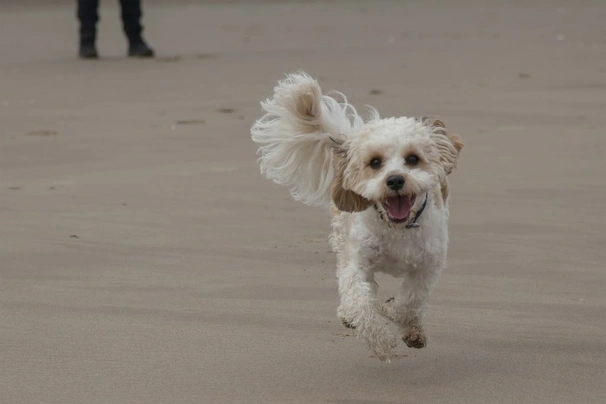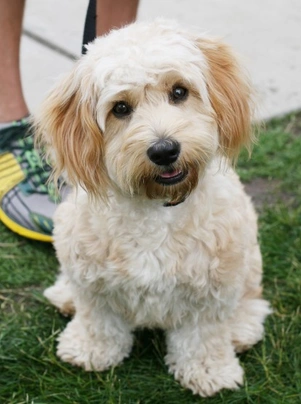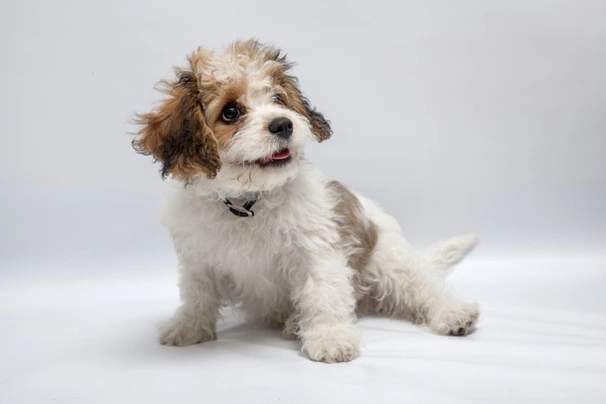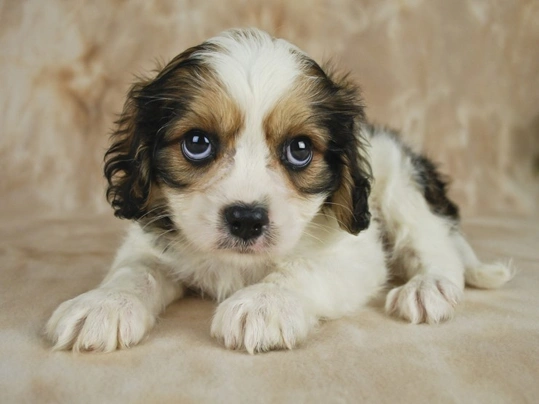Cavachon
Pros
Cons
Introduction of the Cavachon
The Cavachon is a charming hybrid dog created by crossing two beloved pedigree breeds, the Cavalier King Charles Spaniel and the Bichon Frise. Originating in the United States in the mid-1990s, these little dogs rapidly garnered affection worldwide, including in the UK, thanks to their delightful appearance and sweet temperament. Although not yet recognised by The Kennel Club or most official international bodies, dedicated breed clubs have emerged globally striving to promote responsible breeding practices and maintain the health and welfare of this designer breed.
Cavachons vary considerably in size and coat type, often within the same litter, ranging from wavy to curly textures. Despite their individual appearances, all Cavachons are noted for their gentle, affectionate, and trusting nature. These qualities make them wonderful companions and family-friendly pets suitable for a variety of lifestyles.
This hybrid shines as a companion breed due to its sociable and affectionate temperament. They are well-suited to first-time dog owners who have the time to dedicate to their social and exercise needs. Whether living in apartments or houses with moderate garden space, Cavachons adapt well as long as their daily exercise and social interaction requirements are met. Their grooming needs are somewhat higher due to their fluffy coats but rewarding when approached with consistency and care.
Perfect For
Cavachons are ideal for families with children, retirees seeking a loving lap dog, allergy-sensitive individuals drawn to their low-shedding coats, and first-time owners confident in dedicating time to training and socialisation. Their adaptable nature suits apartment dwellers and those with rural homes alike, provided mental and physical stimulation needs are fulfilled.
Key Considerations
Potential owners should be mindful that Cavachons thrive on human companionship and can develop separation anxiety if left alone too long. Their grooming demands require daily brushing and regular professional trims to maintain coat health and prevent matting. Regular health checks to monitor for inherited conditions from their Cavalier and Bichon lineage are essential. Prospective owners should seek reputable breeders committed to health testing and socialising puppies thoroughly to ensure robust, confident adults.
History of the Cavachon
The Cavachon is a relatively recent hybrid, first intentionally bred in 1996 by an American breeder at Century Farm Puppies who crossed the Bichon Frise with the Cavalier King Charles Spaniel. The goal was to produce a companion dog combining the best traits of both parent breeds—namely the Cavalier’s gentle disposition and the Bichon’s hypoallergenic qualities. Over the years, selective breeding has focused on reducing hereditary health issues common to both breeds and emphasising friendly, outgoing temperaments.
Early Development
The initial breeding programmes prioritised first generation (F1) crossings to enhance the likelihood of offspring inheriting the desirable low-shedding coat characteristic, which is typically more pronounced in F1 Cavachons. This approach also tended to yield puppies with pleasant, sociable personalities. Breeders have remained vigilant about choosing healthy, well-tempered parents to mitigate risks of inherited conditions while fostering the affectionate nature the breed is now known for.
Modern Recognition
At present, Cavachons are classed as designer dogs without official status from The Kennel Club or major international canine organisations. Nevertheless, dedicated breed clubs in several countries have emerged to promote responsible breeding and establish voluntary standards. The breed’s popularity continues to rise both in the USA and the UK, bolstered by its reputation as an allergy-friendly companion. Despite the lack of formal recognition, efforts aim to define breed standards and health protocols to secure the Cavachon’s future as a well-loved family dog.
Appearance of the Cavachon
Size and Build
Cavachons are small, compact dogs typically standing between 31 to 33 cm at the withers for both males and females, weighing approximately 4.5 to 9.0 kg. They exhibit a balanced, athletic build with short, sturdy front legs, rounded bodies, level backs, and slightly tucked-up bellies. Their hindquarters are proportionate, and their bushy tails are carried in a relaxed downward position, elevating when the dog is alert or excited.
Coat and Colours
Coat texture varies widely due to the mixed heritage, ranging from straight to wavy or quite curly, requiring frequent grooming especially during coat transitions occurring around 4 to 6 months of age. Their thick, fluffy coats are silky soft, inherited from both the Bichon Frise and the Cavalier King Charles Spaniel. Colour patterns are diverse, including white with black, apricot, or tan markings, solid brown or red, tricolour combinations, and pure white coats.
Distinctive Features
Cavachons boast large, round, expressive eyes lending to their irresistible appeal. Their long, floppy ears resemble those of the Cavalier King Charles Spaniel, complementing their softly contoured heads. Their gait is lively and bouncy, reflecting a fun-loving disposition. Responsible breeders avoid exaggerations such as overly small sizes that could predispose to health issues.
Gender Differences
Size variation between males and females is minimal, with both sexes falling within the same height and weight ranges. Temperamentally, females sometimes display slightly more reserved behaviour, while males may be a tad more exuberant. However, personality largely depends on individual upbringing and socialisation rather than gender.
Temperament of the Cavachon
Core Personality Traits
Cavachons are renowned for their gentle, affectionate, and kind dispositions. They thrive on close human interaction and develop strong, loyal bonds with their families. Their playful, bouncy personalities make them lively companions who enjoy engaging in interactive games and activities. Inheriting intelligence from both parent breeds, they are eager to please and respond well to training, making them excellent companions for first-time dog owners.
Social Behavior
Highly sociable, Cavachons generally get along well with other dogs and household pets, particularly if socialised early. They greet strangers warmly rather than exhibiting aggression, more inclined to alert their owners through gentle barking than acting as protective watchdogs due to their small size and friendly nature. Their temperament suits multi-pet households and families with children.
Working Instincts
While not bred for working roles, Cavachons retain some mild hunting instincts from their parent breeds, which occasionally manifest in chasing small squirrels or cats. However, they do not possess a high prey drive and mostly enjoy social play and companionship above all. Their intelligence and alertness make them quick learners in obedience and behavioural training.
Common Behavioral Challenges
Their strong attachment to owners means Cavachons dislike being left alone for extended periods and can develop separation anxiety if neglected socially. Excessive barking may develop if not managed from puppyhood, especially if boredom sets in due to inadequate mental or physical stimulation. Gentle, consistent training focusing on positive reinforcement helps address these issues effectively. Owners should be aware of the breed’s need for attention and provide companionship or another pet to prevent loneliness-related behaviours.
Intelligence / Trainability of the Cavachon
Cavachons are intelligent and eager learners, often quickly mastering commands and tricks through positive reinforcement. Their affectionate nature means they focus best on trainers with whom they have strong bonds, making training sessions enjoyable and rewarding for both dog and owner. Their sensitivity means harsh methods are counterproductive, potentially causing timidity or behavioural issues.
Puppy Training Priorities
During the first six months, emphasis should be placed on socialisation, including exposure to varied environments, people, sounds, and other animals. Early housetraining may require patience, as some Cavachons take longer to master toileting outside, but consistent routines pay dividends. Basic obedience commands such as come, sit, stay, quiet, leave it, down, and bed should be introduced early to establish clear boundaries.
Training Methods That Work
Positive reinforcement techniques using treats, praise, and play are most effective. Consistency, gentle corrections, and short, engaging sessions help sustain motivation. Clicker training can also be beneficial. Avoid heavy-handed approaches which can damage confidence and trust.
Advanced Training Potential
Cavachons excel in activities like obedience competitions, therapy dog work, and canine sports tailored to smaller breeds. Their intelligence and adaptability allow them to perform well in mental challenges and agility trials when introduced appropriately. Continued training beyond basic commands enhances their quality of life and strengthens the owner-dog bond.
Common Training Mistakes
Allowing small dog syndrome through permissiveness can lead to problem behaviours such as excessive barking and stubbornness. Owners must take a firm yet kind stance and avoid inconsistency. Insufficient socialisation can result in fearfulness or nervousness around strangers and environments. Patience, early intervention, and ongoing training are key to success.
Children and other
Age-Specific Interactions
Cavachons are known to be great family pets because they are so good when they are around children and they like nothing more than to play interactive games with them. They are known to be extremely tolerant by nature however because they are such small dogs children must be taught how to behave and how to handle them to prevent them from injuring or scaring these little dogs. With this said any interaction between dogs and children should be well supervised by an adult to make sure playtime does not get too boisterous which could end up with someone being frightened or getting hurt.
Teaching Children Proper Interaction
Children should learn specific guidelines on how to approach, pick up, and interact with the dog calmly and respectfully. Supervising playtime is critical to prevent overly rough behaviour which can scare or harm the dog.
Breed-Specific Considerations
Given their delicate build, Cavachons do not withstand rough handling well. They have moderate energy levels, so play sessions should be balanced to avoid exhaustion. Their social nature means early introduction to kids fosters lifelong positive relationships.
Creating Safe Environments
A safe play environment with designated calm spaces for the Cavachon to retreat to if overwhelmed is essential. Adults should always supervise interactions to ensure safety and prevent stress on both child and dog. These practices foster trust and a harmonious family dynamic.
Health of the Cavachon
Breed-Specific Health Conditions
The average life expectancy of a Cavachon is typically between 10 and 12 years when receiving proper care and a well-balanced diet suited to their life stage. Due to their hybrid nature, they may inherit health issues from both the Cavalier King Charles Spaniel and Bichon Frise parents which prospective owners should be aware of and prepared to manage.
Common health concerns include excessive tear production, ear infections, skin sensitivities, flea allergies, hip dysplasia (necessitating parent hip scoring), dry eye, episodic falling syndrome, and various eye issues such as cataracts, which require regular eye testing of breeding dogs. Additionally, mitral valve disease (MVD) inherited from Cavaliers is a serious concern, often leading to heart failure by middle age. Responsible breeders conduct annual tests such as cardiac and eye examinations before breeding to minimise these risks.
Vaccination schedules typically begin at 10 to 12 weeks with boosters advised based on veterinary guidance. Spaying or neutering is recommended between 6 to 9 months old for most dogs to promote long-term health benefits. Maintaining a healthy weight and diet is crucial to prevent obesity, which exacerbates many health conditions.
Allergies can be triggered by environmental factors, household chemicals, seasonal pollen, specific food ingredients, parasite bites, dust mites, and mould. Early identification and vet consultation are vital for managing symptoms effectively. Although Cavachons are not recognised by the Kennel Club and lack breed-specific breeding restrictions, it is essential to choose breeders who prioritise health testing and responsible breeding practices to ensure the best outcomes for future puppies.
Caring for the Cavachon
Providing exemplary care for a Cavachon involves a balance of daily grooming, exercise, diet, and health monitoring. Their coat requires regular maintenance, including frequent brushing to prevent tangles and mats and professional grooming every 4 to 8 weeks. Cavachons also benefit from ear hygiene and tear stain management routines to prevent common issues.
Daily Care Routine
A typical day for a Cavachon includes morning and afternoon walks, interactive play, grooming sessions, and rest periods. Monitoring behavior to detect signs of separation anxiety or boredom is important to maintain mental health. Early socialisation and consistent training contribute significantly to a well-adjusted adult dog.
Living Environment Needs
Though adaptable to apartment living, Cavachons do best in secure environments with space to safely explore. A securely fenced garden allows valuable off-lead time. Due to their sensitivity to cold, caring owners should provide warmth and shelter, especially in colder months.
Seasonal Care Adjustments
Summer requires attention to hydration and mobilisation to prevent overheating, while winter necessitates protection against cold weather and shorter outdoor sessions. Increased coat shedding during seasonal changes demands more brushing and grooming.
Senior Care Adaptations
Senior Cavachons require adapted diets with controlled protein and fat intake, veterinary monitoring for age-related conditions such as arthritis, sensory decline, and cognitive changes. Comfortable bedding and moderate exercise help maintain quality of life in older years.
Grooming of the Cavachon
As Cavachon puppies transition from their fluffy baby coats to adult fur, grooming demands increase significantly. Daily brushing is necessary to avoid mats and keep their soft coats looking tidy. Despite being considered low shedders, their coat requires regular attention. Tear staining, a common issue, calls for gentle eye cleaning with a damp cloth to maintain appearance and comfort.
Professional grooming appointments are recommended every 4 to 8 weeks, including coat trimming, nail clipping, ear cleaning, and stain management. Introducing puppies early to grooming tools and sessions encourages acceptance and reduces stress. Home grooming with gloves, slicker brushes, and soft bristle brushes is effective when done gently and consistently.
Common challenges include rapid mat formation if brushing is missed, frequent tear staining, and susceptibility to ear infections due to wax buildup. Preventative care with regular ear checks and cleaning is essential to avoid painful infections. Grooming is also a bonding opportunity that strengthens the human-dog relationship.
Exercise of the Cavachon
Cavachons have moderate to high energy levels, requiring at least 30 to 60 minutes of daily exercise accompanied by regular mental stimulation. Physical activity can include two walks daily—a shorter one in the morning and a longer, engaging walk or playtime later. Access to a secure garden where they can safely roam and burn off excitement is ideal.
Suitable activities include interactive games like fetch, scent work, and beginner agility or obedience tasks tailored for small breeds. Puppies must avoid overexertion and jumping to protect their growing joints and bones. Cold weather may require shorter sessions and protective clothing.
Mental stimulation is equally important, and owners are encouraged to provide puzzle feeder toys, obedience training games, and regular new challenges to keep the Cavachon’s mind sharp, preventing boredom and potential destructive behaviours. A balanced weekly routine mixing physical and cognitive exercises helps maintain a healthy, happy dog.
Feeding of the Cavachon
Cavachons thrive on a consistent, high-quality diet providing balanced nutrition tailored to their age, size, and activity level. Protein should generally range between 14–21%, with fat content kept below 10% for adults to maintain ideal body condition and skin health.
Feeding Schedule Guidelines
Puppies require 3 to 4 meals daily until around 14 to 18 months of age, after which adult feeding reduces to twice a day. Portion sizes depend on the dog's build and exercise demands, with gradual diet transitions essential to avoid digestive disturbances.
Special Dietary Considerations
Due to breed sensitivities, some Cavachons may require avoidance of certain ingredients or supplementation with fatty acids and vitamins to support coat and skin health. Consultation with a vet will help tailor individual diets.
Weight Management
It is critical to monitor for weight gain to prevent obesity, a risk factor for many health problems. Balanced nutrition paired with regular exercise aids in maintaining a healthy physique and long lifespan.
Cavachon price
When considering bringing a Cavachon into your home, be prepared for initial puppy purchase prices typically ranging between 600 to 1,300, depending on breeder reputation and location. Individual breeders may offer puppies from around 600, while licensed breeders generally price from 800 to 1,300. Prices may vary with coat type, colour, and lineage quality. For further options, you can find Cavachon for sale on Pets4Homes.
Initial setup costs including quality crate, grooming tools, feeding supplies, and bedding typically amount to 150 to 300. Monthly expenses for food, grooming products, and routine veterinary care range from 50 to 80, with insurance premiums adding to this depending on coverage levels.
Veterinary costs, vaccinations, booster shots, routine health checks, and potential health issues common to the breed might add significant costs, with lifetime care budgets commonly exceeding 1,000 annually. Responsible budgeting and insurance are advised to manage unexpected medical expenses effectively, ensuring your Cavachon enjoys a healthy and happy life with you.
Buying advice
Purchasing a Cavachon requires diligence to find ethical breeders committed to health, temperament, and welfare. Scams and low-quality breeders pose risks, especially given the breed’s designer status and popularity. Always visit the breeder’s premises, observe puppy and parent health, and verify records including worming, vaccinations, and microchipping.
Finding Ethical Breeders
Look for breeders who perform health screenings on parent dogs, adhere to breeding limits to avoid overbreeding, and demonstrate transparency. Questions about lineage, socialisation, and health testing are vital during visits.
Health Testing Verification
Request evidence of testing for conditions like mitral valve disease, hip scoring, and eye examinations. Knowledge of the breed’s hereditary risks and mitigation strategies is crucial.
Puppy Selection Process
Evaluate puppies for confidence and sociability, preferring lively, outgoing individuals. Health checks for obvious abnormalities and temperament assessments reduce future issues.
Contract and Guarantee Review
Ensure purchase agreements cover health guarantees, return policies, and uphold buyer protection. Beware of vague documentation or reluctance to answer questions.
Rescue and Adoption Options
Consider breed-specific rescues or rehoming organisations for adopting Cavachons, offering loving homes to dogs in need.
To explore available puppies from trusted sources, you can find Cavachon for sale on Pets4Homes.



